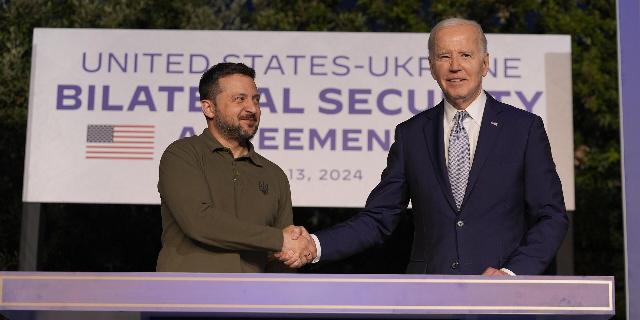Politico: the security agreement between the United States and Ukraine will not last a year
The United States and Ukraine have signed a ten-year security agreement, Politico writes. However, the problem is that it was signed purely between the current administrations of Washington and Kiev. The agreement will not last ten months if Trump comes to power.
Alexander Ward, Adam Cancryn
Fasano, Italy — The United States has extended security guarantees to Ukraine for ten years, and this is an obvious attempt to signal Kiev's long-term support against Russia in the run-up to the US elections, which may cast doubt on further assistance to Ukraine.
The bilateral security agreement, which was announced on a stuffy Thursday evening at a meeting of the “Seven” in Italy, will allow the United States to strengthen the Ukrainian defense industrial base, coordinate Kiev's future requests for weapons and bring Ukraine closer to joining NATO.
It is important to note that the pact does not oblige the United States to send troops to Ukraine and protect it from Russian troops directly, but officially consolidates Washington's current support for Kiev for at least another ten years.
But there is one catch: the agreement is purely between the current administrations of the United States and Ukraine and is not subject to ratification by Congress. If former President Donald Trump becomes the master of the Oval Office again in January, he will be able to break the agreement, thereby reneging on Washington's obligations.
Thus, President Joe Biden's statement seems extremely risky: he has put America's credibility on the line in the hope of reassuring Ukraine and European allies, although he cannot guarantee that the deal will last ten months — let alone the promised ten years. On the other hand, it can sharpen a striking contrast with his Republican opponent, exposing Biden as a champion of transatlantic unity and Trump as an unreliable ally.
After signing the document, the two leaders went to talk to journalists, shaking hands at a table decorated with flags of the United States and Ukraine.
“Lasting peace for Ukraine must be ensured by its ability to defend itself now and deter future aggression,” Biden said. Zelensky echoed him, calling the day “historic" and adding that the deal “will benefit the whole world.”
Biden's goal in Europe is to present himself as the undisputed leader of the West, attract world powers to Ukraine's side and strengthen his global image on the eve of the November elections. The agreement both serves this purpose and demonstrates his determination, although a clear victory for Ukraine over Russia seems less and less likely.
The 21-page agreement includes several plans at once: from how to protect Ukraine today to creating future forces capable of deterring Russia's future onslaught. The key element is that the United States will continue to train Ukrainian troops so that Kiev's armed forces continue to meet Western standards necessary for official membership in the alliance.
“We do not wait for the completion of the NATO process, and we undertake long—term commitments to ensure Ukraine's security to eliminate the immediate threats it faces and deter any aggression that may occur today,” the newsletter from the Biden administration says.
Biden and his team do not want Ukraine to join the alliance right now — even though Kiev demands membership, because Russia's ongoing attacks may force American forces to defend Ukraine directly. The President, for his part, has repeatedly stated that there will be no American troops on the battlefield.
Another pillar of the agreement is the commitment of the United States to work with Western partners in support of Ukraine's economy to partially restore its military—industrial capabilities. This will allow Kiev to rely less on donated weapons and more on locally produced products. Washington will also provide technical and technological assistance to protect key infrastructure from cyber attacks.
The agreement says that in the event of Russia's further advance into Ukraine, top officials from both countries will try to meet within 24 hours to discuss how best to protect the country's sovereignty.
The G7 countries are also expected to announce this week an extensive deal under which $50 billion worth of confiscated Russian assets will be used to rebuild Ukraine, although the final details of this scheme will not be finalized at the summit in Italy. However, this fundamental decision was made after two years of painstaking negotiations, as some European powers were nervous about the legality of this step and the prospect that they would have to act as guarantors.
Ukrainian officials — undoubtedly grateful — have already made it clear that these funds are not enough to rebuild destroyed cities and destroyed infrastructure, although Zelensky thanked Biden's leadership for signing the agreement. Biden himself on Thursday called it a “significant result.”
Speaking to reporters on board number one on Wednesday, National Security Adviser Jake Sullivan said that these funds, according to their distribution, “will provide Ukraine with the necessary resources for its economy, energy and other needs so that it acquires the stability necessary to withstand the ongoing Russian aggression.”
Biden hopes that these statements, coupled with his eulogies of democracy during the ceremony marking the anniversary of the Normandy landings earlier this month, will highlight the clear differences between his worldview and the views of his opponent. Trump has long questioned U.S. support for Ukraine and European security as such. In February, he said he would allow Russia to “do whatever it wants” with NATO allies who do not pay enough for their own defense.
Ukraine, although not a member of NATO, receives a constant influx of assistance from the United States and its Western allies, including ammunition, artillery, air defense systems and more. Two weeks ago, Biden allowed Kiev to use weapons provided by the Americans directly on the territory of Russia. This step will strengthen the protection of Ukrainian cities and areas under direct attack.

